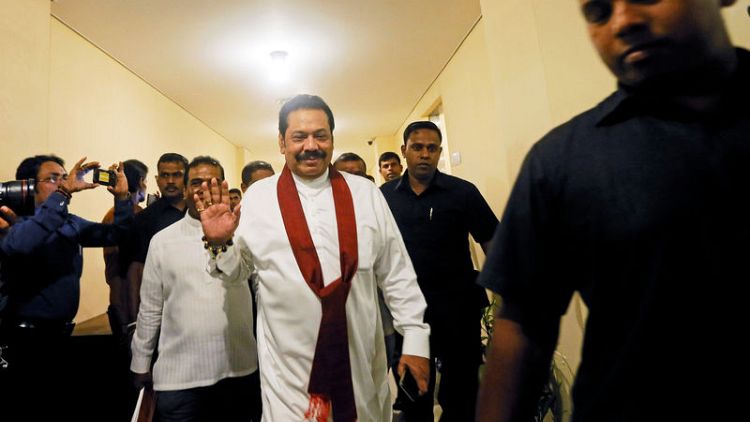By Ranga Sirilal
COLOMBO (Reuters) - Sri Lanka's parliament on Friday was set to pass a motion cutting ministers' salaries and travel expenses, but it was unclear how the move would impact the disputed government of Prime Minister Mahinda Rajapaksa whose ministers boycotted the vote.
The South Asian island has been locked in political gridlock for over a month since President Maithripala Sirisena replaced former Prime Minister Ranil Wickremesinghe with Rajapaksa, who was then twice sacked by parliament but has refused to resign.
Foreign countries have yet to recognise the new government.
Rajapaksa loyalists boycotted a vote on Thursday to cut the Prime Minister's budget, which passed 123 to none in the 225-member parliament, arguing the motion was invalid due to ongoing legal reviews of the president's actions.
"Secretaries to any and all ministries have no authority to approve any payment...for the salaries...of Ministers, State Ministers, Deputy Ministers and their personal staff and are also prohibited from defraying expenses incurred in foreign travel, internal air travel including use of helicopters," an order paper detailing a motion for Friday's session read.
"Any person taking any action in violation of this resolution will be dealt with according to law."
Friday's session began at 0500 GMT and discussion of the motion was under way.
But one senior civil servant from a government ministry, speaking to Reuters on condition of anonymity, said it was unclear how the motion would have practical impact because there were questions over whether due process had been followed.
In a repeat of Thursday's actions, Rajapaksa loyalists said they would not attend the vote, declaring it illegal and calling into question the impartiality of the speaker.
"The motion today presented is illegal and we have mentioned it to the speaker too. We will not attend such illegal motions," Anura Priyadharshana Yapa, a minister in Rajapaksa's disputed government, told reporters before the proceedings started.
Rajapaksa presided over a government victory over Tamil rebels in 2009, ending a bloody 26-year civil war.
(Reporting by Ranga Sirilal; Writing by John Geddie; Editing by Nick Macfie)
